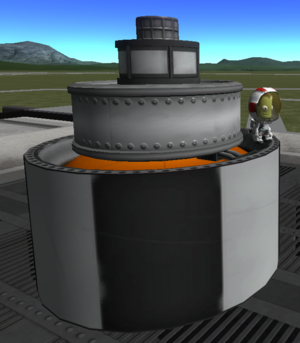Difference between revisions of "Radial size"
(+Revamped caption for updated picture. +Table examples all engines now.) |
m (minor update) |
||
| Line 1: | Line 1: | ||
[[File:Radial size comparison.png|thumb|Comparison of radial sizes with a Kerbal for scale. From top to bottom: Tiny (Size 0), Small, Large, and Extra Large (Size 3).]] | [[File:Radial size comparison.png|thumb|Comparison of radial sizes with a Kerbal for scale. From top to bottom: Tiny (Size 0), Small, Large, and Extra Large (Size 3).]] | ||
| − | The '''radial size''' is the diameter or mounting position for most parts. If the mounting position is not radial, then the part is either round or one of two special forms. Such rectangular parts as the [[M-1x1 Structural Panel]] lack a radial size or it's a size to the next bigger diameter like the [[Probodobodyne QBE]]. | + | The '''radial size''' is the diameter or mounting position for most parts. If the mounting position is not radial, then the part is either round or one of two special forms. Such rectangular parts as the [[M-1x1 Structural Panel]] lack a radial size or it's a size to the next bigger diameter like the [[Probodobodyne QBE]]. Four radial sizes exist with varying names. The size scale looks like the internal definition as the [[Mk2 to size 1 Adapter]] uses this term and starts with <tt>0</tt> and many values in computer programming are starting from 0 rather than 1. |
Any stackable part can be connected to any other stackable part. Matching radial sizes only serves to give a rocket a cleaner visual appearance, and several adapter parts exist to allow transitions between radial sizes while maintaining an unbroken surface. | Any stackable part can be connected to any other stackable part. Matching radial sizes only serves to give a rocket a cleaner visual appearance, and several adapter parts exist to allow transitions between radial sizes while maintaining an unbroken surface. | ||
Revision as of 04:39, 11 May 2014
The radial size is the diameter or mounting position for most parts. If the mounting position is not radial, then the part is either round or one of two special forms. Such rectangular parts as the M-1x1 Structural Panel lack a radial size or it's a size to the next bigger diameter like the Probodobodyne QBE. Four radial sizes exist with varying names. The size scale looks like the internal definition as the Mk2 to size 1 Adapter uses this term and starts with 0 and many values in computer programming are starting from 0 rather than 1.
Any stackable part can be connected to any other stackable part. Matching radial sizes only serves to give a rocket a cleaner visual appearance, and several adapter parts exist to allow transitions between radial sizes while maintaining an unbroken surface.
Assets
When creating assets, the correct diameter for a desired model can be found in the table below. The "meter scale" refers to the actual model's diameter, which is then typically scaled up via the default rescaleFactor of 1.25, to give the "actual" in-game diameter. Size scale is used to denote the standard when selecting a node size.
| Name | Size scale | Meter scale | Actual size | Example |
|---|---|---|---|---|
| Tiny | 0 | 0.5 m | 0.625 m | Rockomax 48-7S |
| Small | 1 | 1 m | 1.25 m | LV-T30 Liquid Fuel Engine |
| Large | 2 | 2 m | 2.5 m | Rockomax "Mainsail" Liquid Engine |
| Extra large | 3 | 3 m | 3.75 m | Kerbodyne KR-2L Advanced Engine |
As a special radial size Radial mounted appears. Parts like Rockomax 24-77 so lack general metric counterparts as to eliminate confusion.
Non-cylindrical sizes named "Mk1", “Mk2”, and “Mk3” exist and are used by fuselage parts intended for spaceplanes.
